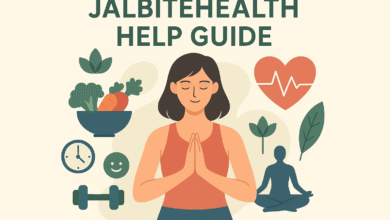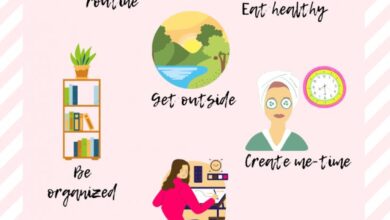Tips for Better Sleep: How to Rest Well and Wake Up Refreshed

Do you ever find yourself tossing and turning at night, staring at the ceiling, wishing you could just fall asleep? You’re not alone. Millions of people struggle with sleep, whether it’s trouble drifting off, waking up during the night, or feeling exhausted even after a full eight hours. Sleep problems affect more than just your energy—they can impact your mood, focus, and long-term health.
The good news is that better sleep is within your reach. By making small but powerful changes in your daily routine and bedtime habits, you can improve the quality of your rest and wake up feeling truly refreshed. In this guide, we’ll explore practical, science-backed tips for better sleep that you can start using tonight.
Why Sleep Matters More Than You Think
Sleep is often the first thing people sacrifice when life gets busy. But it’s not just a period of rest—it’s a crucial process for your body and mind. While you sleep, your brain consolidates memories, your muscles repair themselves, and your hormones reset.
Without enough quality sleep, you’re more likely to feel irritable, lose focus, and even struggle with health issues like weakened immunity or high blood pressure. That’s why prioritizing good sleep isn’t just about comfort—it’s about overall well-being.
Create a Consistent Sleep Schedule
One of the most effective ways to improve sleep is to go to bed and wake up at the same time every day—even on weekends. A consistent routine trains your body’s internal clock, also known as the circadian rhythm.
When your sleep schedule is regular, you fall asleep faster and wake up naturally without hitting the snooze button ten times. Start by setting a realistic bedtime and wake-up time that you can stick to most days. Over time, your body will adjust, making sleep feel effortless.
Build a Relaxing Bedtime Routine
Your body needs signals to know when it’s time to wind down. A bedtime routine does exactly that. Try creating a calming ritual that helps you transition from the busyness of the day to a state of rest.
This might include:
- Reading a few pages of a book
- Taking a warm shower or bath
- Listening to calming music or guided meditation
- Practicing gentle stretches or yoga
By repeating the same activities nightly, your brain learns to associate them with sleep, making it easier to drift off.
Optimize Your Sleep Environment
The space where you sleep has a huge impact on rest quality. A cluttered, noisy, or uncomfortable bedroom can make it hard to relax. Here are some simple adjustments:
- Keep it cool: Aim for a room temperature around 65–68°F (18–20°C).
- Block light: Use blackout curtains or an eye mask.
- Reduce noise: Try earplugs, white noise machines, or soothing background sounds.
- Invest in comfort: A supportive mattress and cozy pillows make all the difference.
Turning your bedroom into a sleep-friendly sanctuary can transform your nights.
Limit Screen Time Before Bed
Scrolling through your phone or watching TV late at night might feel relaxing, but screens emit blue light that tricks your brain into staying alert. This reduces melatonin, the hormone that helps you fall asleep.
Try setting a “digital curfew” an hour before bed. Instead of screens, choose activities that calm your mind—like reading, journaling, or listening to music. If you must use your phone, consider blue-light filter apps or glasses to reduce the impact.
Be Mindful of What You Eat and Drink
What you consume during the day can affect how well you sleep at night. Large meals, spicy foods, and caffeine close to bedtime often lead to discomfort or restlessness.
- Caffeine: Avoid coffee, tea, or energy drinks at least 6 hours before bed.
- Alcohol: While it may make you sleepy initially, it disrupts deep sleep cycles.
- Late-night snacks: If you’re hungry, opt for light foods like yogurt, fruit, or a small handful of nuts.
Being mindful about food and drink choices helps your body relax more easily at night.
Exercise Regularly, But Not Too Late
Physical activity is one of the best natural ways to improve sleep. Exercise reduces stress, increases relaxation, and promotes deeper sleep cycles.
However, timing matters. Intense workouts too close to bedtime can raise adrenaline levels and make it harder to unwind. Aim for morning or afternoon exercise, or stick to calming activities like yoga or stretching in the evening.
Manage Stress and Calm the Mind
Racing thoughts are one of the biggest sleep disruptors. If your mind feels too busy at night, it’s important to find ways to manage stress before bedtime.
Some effective techniques include:
- Journaling: Write down worries or to-do lists so your brain can let go.
- Meditation: Even 10 minutes of mindfulness can quiet the mind.
- Breathing exercises: Slow, deep breathing signals your body to relax.
By calming your mind, you create space for restful sleep instead of restless nights.
Limit Naps During the Day
Naps can be refreshing, but too much daytime sleep can interfere with your nighttime rest. If you need to nap, keep it short—around 20 to 30 minutes—and avoid late-afternoon naps.
This way, you’ll get the energy boost you need without throwing off your sleep schedule.
Exposure to Natural Light
Your body’s sleep-wake cycle depends heavily on light. Getting sunlight in the morning helps reset your circadian rhythm, signaling your body when it’s time to be awake and when it’s time to rest.
Spend time outside each day, even if it’s just a short walk. If natural sunlight is limited, consider using a light therapy lamp in the morning.
Avoid Watching the Clock
Do you check the clock when you can’t sleep? Watching the minutes tick by usually makes you more anxious, which only delays sleep further.
Instead, turn your clock away from view. If you can’t fall asleep after 20 minutes, get up and do something relaxing like reading or stretching until you feel drowsy again.
Keep Your Bed for Sleep Only
To train your brain to associate your bed with rest, avoid using it for work, watching TV, or scrolling on your phone. Your bed should be a place of comfort and relaxation, not stress or stimulation.
This simple shift helps create a stronger mental link between lying down and falling asleep.
Hydration and Sleep Balance
Staying hydrated during the day is important, but drinking too much water right before bed can lead to frequent bathroom trips that disrupt sleep. Try to drink plenty of fluids earlier and reduce intake in the last hour before bedtime.
This keeps you hydrated without cutting into your rest.
Consider Sleep-Friendly Supplements
For some people, natural supplements can provide a gentle boost toward better sleep. Options like melatonin, magnesium, or herbal teas (such as chamomile or lavender) may help.
However, it’s best to use them cautiously and check with a healthcare provider before starting new supplements, especially if you take other medications.
Listen to Your Body’s Natural Rhythm
Not everyone is built to be an early bird. Some people naturally thrive later in the day. While society often favors early risers, the key is to align your schedule as much as possible with your body’s natural rhythm.
Pay attention to when you feel most alert and when you feel naturally sleepy. Working with your body, instead of against it, often leads to better rest.
When to Seek Professional Help
If you’ve tried multiple strategies and still struggle with sleep, it may be time to seek professional advice. Conditions like insomnia, sleep apnea, or restless legs syndrome may require medical support.
Don’t hesitate to consult a doctor or sleep specialist if poor sleep continues for weeks or months. Sleep is too important to ignore.
Combining Techniques for Best Results
The most effective approach to better sleep often comes from combining several techniques. For example, you might:
- Follow a consistent sleep schedule
- Practice a calming bedtime routine
- Keep your bedroom cool and dark
- Avoid caffeine late in the day
- Try deep breathing before bed
Together, these habits create an environment where restful sleep becomes the natural outcome.
Final Thoughts: Sleep as Self-Care
Good sleep is not a luxury—it’s a vital part of self-care. By paying attention to your habits, environment, and stress levels, you can transform the way you rest.
Remember, improving sleep doesn’t require drastic changes overnight. Start small. Pick one or two tips from this guide and try them consistently. Over time, you’ll notice yourself falling asleep more easily, staying asleep longer, and waking up with more energy.
Better sleep means a better you—healthier, happier, and ready to take on the day.



